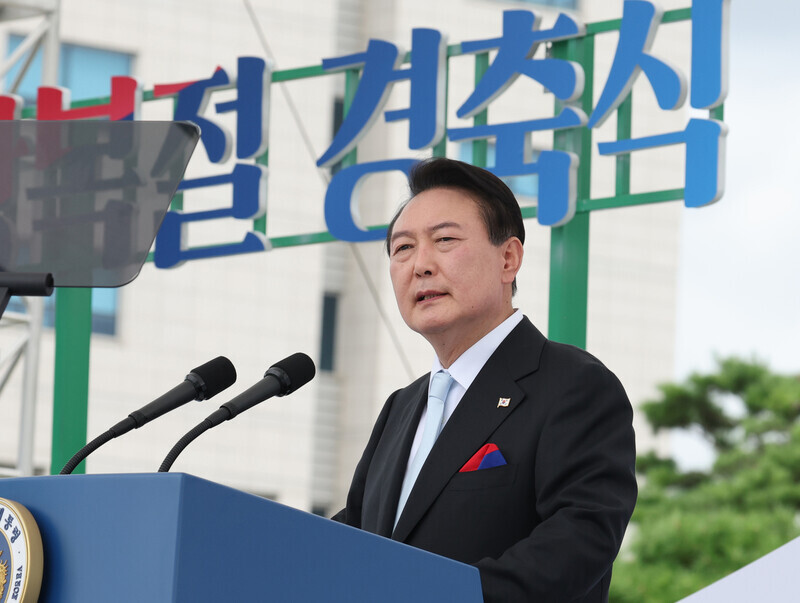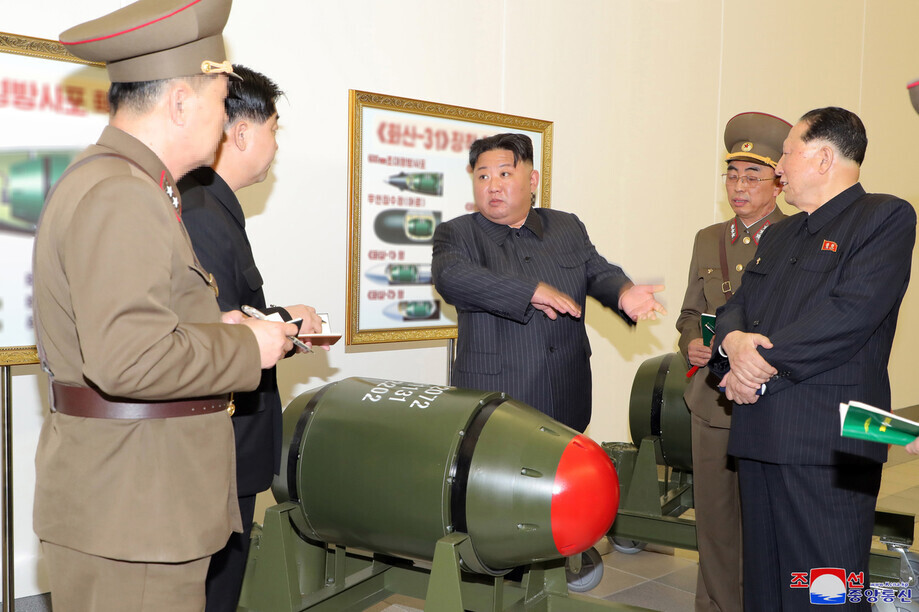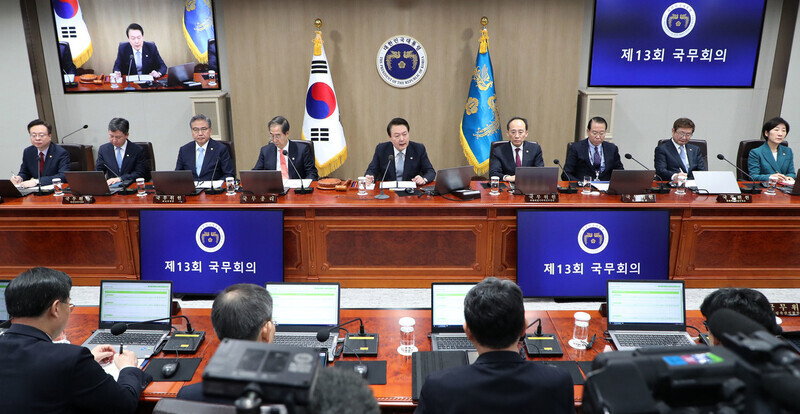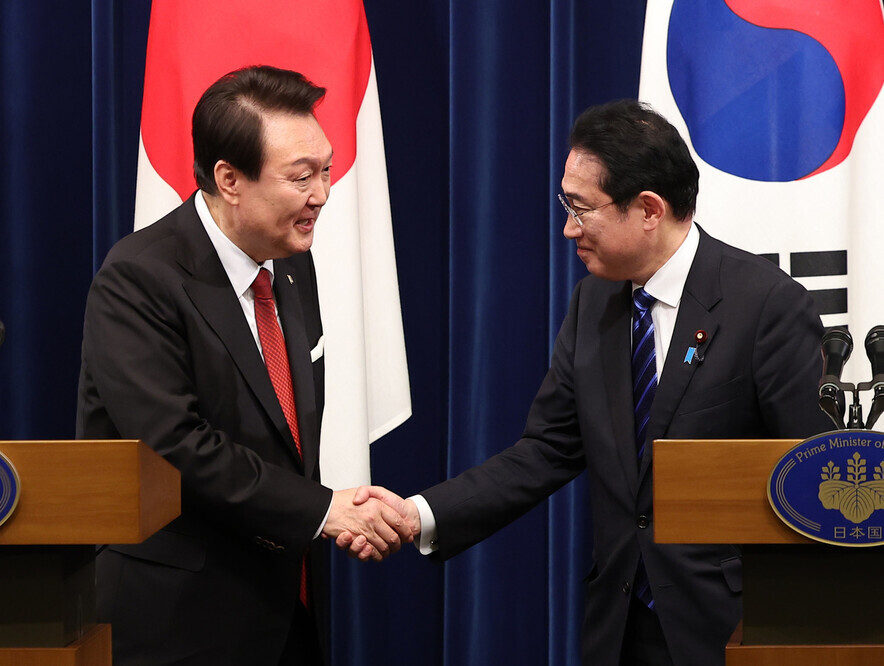hankyoreh
Links to other country sites 다른 나라 사이트 링크
Even Park Chung-hee talked to N. Korea — so why won’t Yoon?

I came across an anecdote about President Yoon Suk-yeol in a JoongAng Ilbo column by Kim Hyun-ki this March. In April 2022, while still the president-elect, Yoon met Chung Jin-seok and other members of the special envoy to Japan for dinner. There, he supposedly stated that he turned away a bottle of popular soju brand Cheoeum Cheoreom and said that he “didn’t drink such stuff” because the calligraphy on the logo was done by Shin Young-bok, an intellectual and activist who was imprisoned during the military dictatorship. At the time I thought that of course there was no way he had actually said that.
It seems I was wrong. I have recently come to realize that Yoon is a man who is perfectly capable of making such remarks. After a Cabinet meeting on March 28, presidential office spokesperson Lee Do-woon introduced Yoon’s remarks as follows.
“The Ministry of Unification should stop giving away money to North Korea and make it clear that we won’t give a single penny to North Korea while it pursues the development of nuclear weapons.”
“Investigating the human rights, political, economic and social realities of North Korea through various routes and informing the public at home and abroad is the key roadmap for security and unification.”
“At the West Sea Defense Day event at the Daejeon National Cemetery last week, the bereaved families asked, ‘Why do people who always want Japan to apologize to us not ask the same of North Korea? North Korea killed our children.’ This sort of mindset should be more universal.”
I couldn’t believe it. I was in such disbelief I had to read over the comments over and over again.

Yoon is a president affiliated with a conservative party. It’s no surprise that he is strongly committed to North Korea’s denuclearization and improving human rights there. His presidential campaign platform included “realizing the complete denuclearization of North Korea” and “establishing a North Korean human rights foundation as soon as possible.” But his recent comments are very, very strange.
First of all, it’s difficult to see the correlation between linking North Korean human rights and the roadmap to security and unification. It sounds like he means that properly informing the public about the reality of human rights in North Korea will lead to the people thinking about national security in earnest and therefore accelerating unification, but I still can’t wrap my head around the point he’s trying to make.
“Stop giving away money to North Korea” also doesn’t make any sense. What kind of money has the Ministry of Unification been giving to North Korea? Inter-Korean relations have been virtually cut off since the beginning of Yoon’s presidency. In fact, it has been virtually non-existent since the breakdown of the Hanoi summit in 2019 during the Moon Jae-in administration.
The overly emotional phrase of “won’t give a single penny” is also difficult to understand. It treats North Korea as a beggar. An embarrassed Ministry of Unification later tried to do cleanup over the comment by stating, “There is no change in the current status quo where we provide humanitarian aid.”
Yoon’s tough talk seems to be a response to North Korea’s recent show of force, such as North Korean leader Kim Jong-un’s order to expand production of nuclear weapons. However, there is a need for dignity and restraint in the president’s public statements. A few heavy-hitting words can be more powerful than a stream of vitriol.
Moreover, saying that the sentiment held by the families of those killed in the Cheonan sinking in 2010 that “those quick to tell Japan to apologize should demand that North Korea apologize for killing our children” should be universal is in itself violent.
That sentiment is something that the bereaved families can say, but not what the president should say. This is tantamount to saying, “If you’re against improving South Korea-Japan relations, you are a dirty communist” — a dangerous statement that runs the risk of dividing our people into the categories of “Japanese collaborators” and “pro-Pyongyang.”
On March 21, Yoon said in a Cabinet meeting that the previous government had “left the bilateral relationship between South Korea and Japan in a quagmire,” and that “there are forces in our society that are trying to make political gains by shouting for an exclusive kind of nationalism and anti-Japan sentiments” – clearly attacking ex-President Moon Jae-in and the Democratic Party with red-baiting.

This attitude of Yoon’s has been evidenced numerous times in the past as well.
As a People Power Party (PPP) presidential candidate, he attended a launch ceremony for the party’s North Gyeongsang Province election committee on Dec. 29, 2021, where he said, “With the Moon Jae-in administration in office, groups of people who joined the democratization movement ranks after learning things like left-wing revolutionary ideology and North Korean juche ideas, and who continue even now helping each other out as if they were ‘fighters for democracy,’ have been plundering the state and the people since the Moon Jae-in administration came to office.”
Meeting with PPP extra parliamentary party negotiating committee leaders on Oct. 19 of last year, he said, “People in the pro-Pyongyang juche wing are neither progressives nor leftists, and it is impossible to govern with hostile anti-state forces.”
This mindset echoes the logic of those who have a vested interest in Korea’s division and continue to paint as “pro-Pyongyang” people who campaign for democracy in the face of South Korea’s dictatorial regimes. It parrots the claims of the “Taegeukgi Brigade,” a group with an extreme right-wing ideology.
When did Yoon develop this kind of far-right belief system? Did it take shape over a long period spent working with the prosecutors — a group that exists to uphold the system? Or is it something that emerged after he joined the conservative PPP?
Whatever the answer is, it’s a very unfortunate thing for South Koreans that their president is so deeply devoted to far-right ideas.
When Yoon first got into politics, he didn’t have much to say about inter-Korean relations. He was obliged to adopt a cautious stance, since it was an area he was not all that familiar with.
He didn’t mention inter-Korean relations at all when he declared his presidential run on June 29, 2021. In his speech accepting the PPP presidential nomination the following Nov. 3, he merely said he would “coordinate closely with the international community to pursue denuclearization more efficiently.”
Shortly after he was elected last year, he said in a March 10 speech that he intended to “respond firmly and according to principle to North Korea’s illegal and irrational actions, while keeping the door always open for inter-Korean dialogue.”
In his inaugural address on May 10, he declared, “If North Korea genuinely embarks on a process to complete denuclearization, we are prepared to work with the international community to present an audacious plan that will vastly strengthen North Korea’s economy and improve the quality of life for its people.”
In a celebratory address for the National Liberation Day holiday on Aug. 15, he presented a six-point proposal that included food assistance (linking supplies of food and daily essentials with North Korea’s buried resources such as minerals and rare-earth metals), power transmission and distribution infrastructure support, a project to modernize ports and airports for international trade, assistance with technology to boost agricultural productivity, assistance with hospital and medical infrastructure modernization, and international investment and financial support.
In reality, this was a hollow proposal with little chance of ever being realized. While he may have emphasized modernizing ports and airports, he made no mention of resuming railway operation between South and North. He did not say anything about the Kaesong Industrial Complex or the Mt. Kumgang tourism venture.
During the presidential election, Yoon pledged to “restore the joint South Korea-US military exercises that were drastically downscaled during the Moon Jae-in administration.” It was entirely predictable that stepping up military drills would spark an outcry from Pyongyang — yet he had no response prepared for that.
Predictably, South Korea and the US restored their military exercises, and North Korea pushed back with missile launches and nuclear weapon threats. Yoon has been countering that with an even more militant posture. We now find ourselves mired in a vicious cycle of matching force with force.

There are several factors that this can be attributed to. For my part, I think that a large factor has been Yoon’s lack of a philosophy or strategy regarding the Korean Peninsula and the surrounding political situation.
In the US, Japan, and South Korea, you find a military-industrial complex and far-right figures who seek financial gain by feeding off of the Korean Peninsula’s division. They position the peninsula as the stage for a confrontation between maritime powers (South Korea, the US, Japan) and continental powers (North Korea, China, and Russia), while stirring the pot by insisting that the former must vanquish the latter.
Yoon’s mistake has been to all too readily climb on board with the confrontation frame crafted by these figures with a vested interest in Korea’s division. His hasty push to improve relations with Tokyo this year appears to be part of that trend.
When this happens, we sacrifice our leadership over the Korean Peninsula’s political situation. Instead of being the peninsula’s masters ourselves, we end up under the sway of our neighbors. That is a big problem.
Yoon’s decision has been quite different from the attitudes and actions of past South Korean presidents when it comes to the peninsula’s political situation.
In 1968, North Korea sent 31 commandos in an assassination attempt against then-President Park Chung-hee. Yet Park subsequently engaged in dialogue with Pyongyang and ended up adopting the July 4 South-North Joint Communiqué in 1972.
Even after the 1983 bombing attack against him in Burma (Myanmar), Chun Doo-hwan accepted a North Korean flood damage recovery assistance proposal in 1984, taking it as an opportunity to improve inter-Korean relations. There ended up being Red Cross, economic, and athletic competition talks between the two sides, as well as reciprocal visits among separated family members in 1985. Secret envoys also exchanged visits to pave the way for an inter-Korean summit.
The actions taken by Roh Tae-woo as president — his Nordpolitik and adoption of the South-North Basic Agreement, South and North Korea simultaneously joining the US, and the joint declaration on denuclearization of the peninsula — are already well known, and there is no need for me to explain them here.
In 1994, then-President Kim Young-sam agreed to hold an inter-Korean summit with Kim Il-sung. That ended up falling through after Kim’s sudden death — but if it had happened, it might have hastened peace on the peninsula, and North Korea might not have gone ahead with its nuclear program.
Under the Lee Myung-bak and Park Geun-hye presidencies, inter-Korean relations were profoundly strained. This stemmed from a number of complicating factors, including the US’ freezing of North Korean funds at Banco Delta Asia, an incident in which a South Korean tourist was shot and killed at Mt. Kumgang, the North’s nuclear testing and missile launches, and the shutdown of operations at the Kaesong Industrial Complex.
Since Yoon took office, inter-Korean relations appear even worse than they were under Lee or Park. That’s worrying.
On March 29, Kim Sung-han was abruptly replaced as director of the National Security Office. The reasons behind his departure are not precisely known.
Perhaps Yoon took too casual an attitude toward replacing his key foreign affairs and national security advisor. Perhaps he didn’t think at all.
That would be deeply concerning. How do you see it?
By Seong Han-yong, senior editorial writer
Please direct questions or comments to [english@hani.co.kr]

Editorial・opinion
![[Column] Will Seoul’s ties with Moscow really recover on their own? [Column] Will Seoul’s ties with Moscow really recover on their own?](https://flexible.img.hani.co.kr/flexible/normal/500/300/imgdb/original/2024/0513/5917155871573919.jpg) [Column] Will Seoul’s ties with Moscow really recover on their own?
[Column] Will Seoul’s ties with Moscow really recover on their own?![[Column] Samsung’s ‘lost decade’ and Lee Jae-yong’s mismatched chopsticks [Column] Samsung’s ‘lost decade’ and Lee Jae-yong’s mismatched chopsticks](https://flexible.img.hani.co.kr/flexible/normal/500/300/imgdb/original/2024/0512/3017154788490114.jpg) [Column] Samsung’s ‘lost decade’ and Lee Jae-yong’s mismatched chopsticks
[Column] Samsung’s ‘lost decade’ and Lee Jae-yong’s mismatched chopsticks- [Correspondent’s column] The real reason the US is worried about Chinese ‘overcapacity’
- [Editorial] Yoon’s gesture at communication only highlights his reluctance to change
- [Editorial] Perilous stakes of Trump’s rhetoric around US troop pullout from Korea
- [Guest essay] Preventing Korean Peninsula from becoming front line of new cold war
- [Column] The state is back — but is it in business?
- [Column] Life on our Trisolaris
- [Editorial] Penalties for airing allegations against Korea’s first lady endanger free press
- [Editorial] Yoon must halt procurement of SM-3 interceptor missiles
Most viewed articles
- 1Seoul’s plan to adopt SM-3 missiles is like wanting a sledgehammer to catch a fly
- 2[Column] Samsung’s ‘lost decade’ and Lee Jae-yong’s mismatched chopsticks
- 3[Correspondent’s column] The real reason the US is worried about Chinese ‘overcapacity’
- 4Korea poised to overtake Taiwan as world’s No. 2 chip producer by 2032
- 560% of young Koreans see no need to have kids after marriage
- 6[Editorial] Yoon’s gesture at communication only highlights his reluctance to change
- 7Yoon voices ‘trust’ in Japanese counterpart, says alliance with US won’t change
- 8Yoon rejects calls for special counsel probes into Marine’s death, first lady in long-awaited presse
- 9S.K.-Japan joint history project to be revived
- 10Former President Roh Tae-woo, mastermind of 1979 military coup, dies at 88